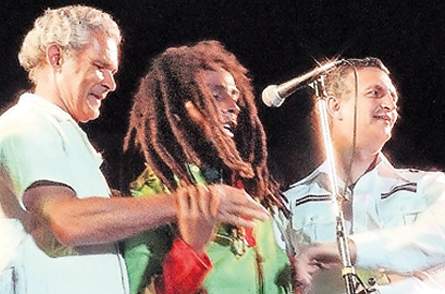 One of the most iconic events in Jamaica's history as an independent country was the One Love Peace Concert of April 22, 1978, organized by reggae superstar Bob Marley in response to the wave of deadly political violence that was then gripping the island nation.
One of the most iconic events in Jamaica's history as an independent country was the One Love Peace Concert of April 22, 1978, organized by reggae superstar Bob Marley in response to the wave of deadly political violence that was then gripping the island nation.
At the climax of the event, Marley, amid a rendition of his hit "Jammin'," brought Jamaica's two rival political leaders on to the stage at the National Stadium in Kingston, and made them shake hands. They were both reluctant, and the shake was awkward, mutually grudging. But it happened, an ebullient Marley standing between the two sullen statesmen, literally guiding their hands together with his own.
One of these two rivals was then Prime Minister Michael Manley, a populist of the left. The other was his conservative opponent, Edward Seaga—who has just died on his 89th birthday, May 28.
Marley's idealistic gesture was met with skepticism by many—including his former bandmate Peter Tosh, who during his own set at the concert went into a tirade, berating both Manley and Seaga for failing to help Jamaica's poor, or to legalize cannabis. He then launched into a rendition of his own hit, "Legalize It."
And indeed, the Peace Concert failed to bring about peace. In those years, Jamaica, like too many countries around the world, was caught up in Cold War polarization. Manley—the son of Norman Manley, who had led Jamaica through independence from the United Kingdom in 1962—was elected in 1972, and sought (at least) an equidistant course between the two superpowers. He extended diplomatic recognition to the Soviet Union and Cuba, declared himself a "democratic socialist," and (most significantly) made the government a majority partner in bauxite mining operations.
By the time of the next elections, in 1976, Jamaica was spiraling into crisis. US aid was suspended, and economic suffering made for lots of angry, unemployed youth ripe to be exploited by political factions. Manley's ruling People's National Party (PNP) and the opposition Jamaica Labour Party (JLP) each groomed street gangs and pitted them against each other. Bloodshed escalated and the tourism industry evaporated—deepening the crisis further, in a vicious cycle.
Seaga, a parliamentarian and Boston-born son of a Lebanese-Jamaican businessman, had by then emerged as leader and candidate of the JLP—a party of the political right, despite its name. Perhaps somewhat counterintuitively, he was a veteran of Jamaica's music industry, having produced a few albums of the island's traditional folk singers. But now he was the man who stood for bringing Jamaica firmly back into the US orbit. Manley prevailed over Seaga—but in an election that took place under a state of emergency.
Manley's supporters saw the crisis as enflamed behind the scenes by the US Central Intelligence Agency, following the playbook of destabilization of unfriendly regimes seen in Iran in 1953, Guatemala in 1954, Indonesia in 1965 and Chile in 1973. There were rumors of guns flowing in to the JLP-aligned street gangs from the US, and right-wing Cuban militants brought in by the CIA to back them up. Seaga won the unflattering monicker "CIA-ga."
Alas, the violence only escalated after the Peace Concert. The 1980 elections again pitted Manley against Seaga, and that was the bloodiest year yet—with perhaps 800 lives lost to political violence. This time, Seaga emerged victorious.
The tide was turning worldwide. Reagan was elected in the United States that same year, and Thatcher was already in power in the UK. Seaga followed the rightward trajectory. He broke ties with Cuba, and imposed economic austerity in cooperation with the International Monetary Fund—although the bauxite interests were already departing for more stable and compliant source countries, and the Jamaican industry never recovered.
Manley and the PNP returned to power in 1988, but by then Seaga had completely changed Jamaica's political complexion. Manley had abandoned his socialism, and pursued policies not too distant from those of his rival. Seaga remained at the helm of the JLP, but never returned to power.
The Peace Concert still stands as a shining moment of hope for reconciliation and shared humanity amid political strife, even if it failed to de-escalate the situation in Jamaica. And Peter Tosh (himself murdered in 1987) might be vindicated that Jamaica's new 2015 Ganja Law allows cultivation for medicinal purposes, and even permits sacramental use by Rastafarians. Former sugar plantations are being converted to the new crop, and exports to Canada are already in progress. Cannabis may yet replace bauxite as a more environmentally sound mainstay of Jamaica's legal economy, and a source of social cohesion as the bitter memory of the island's near-destabilization fades into the past.
This story first ran May 31 in Freedom Leaf
Image via the Jamaica Gleaner







Recent comments
2 weeks 3 days ago
2 weeks 3 days ago
5 weeks 4 days ago
6 weeks 3 days ago
10 weeks 3 days ago
14 weeks 2 days ago
18 weeks 2 days ago
19 weeks 13 hours ago
29 weeks 12 hours ago
33 weeks 23 hours ago